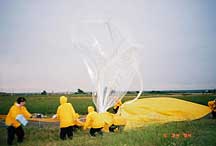
|
Videos |
Thunderstorm Electrification and Lightning Experiment
TELEX 2004 Overview Video
There were two broad objectives to the 2004 TELEX project: One was to try to understand better why storms tend to produce a lot of positive cloud-to-ground flashes. The second part looked at the electrification of mesoscale convective systems.

Play
video with Windows Media Player (.wmv, 72.2 mb)
Play video with Real
Player (.rmvb,
14.5 mb)
Text transcript
Examples of Launches of Instrumented Balloons in Storms
The videos show the launch sequence used during the Severe Thunderstorm Electrification and Precipitation Study, based in Goodland, Kansas, in 2000. It is the same procedure being used in the Thunderstorm Electrification and Lightning Experiment in Oklahoma. There are two types of weather balloons used: latex (beige colored) and plastic (clear). The plastic is used to minimize the effects of hail hitting the balloon, i.e, the plastic does not burst instantly when punctured. The latex balloon is used if hail is not expected, such as in stratiform rain of certain areas of mesoscale convective systems.
The basic instrument train consists of a parachute; a radiosonde for measuring temperature, relative humidity, pressure, and GPS-derived winds and location; and an electric field meter for measuring the vector electric field in the storm along the flight path. Prior to launch, a balloon is encased in the launch tube and inflated with helium. The counting you may hear in the videos is our keeping track of timers set for 30 seconds. When the 30 seconds has elapsed, lines are melted and the electric field meter is lowered gently away from the balloon. In the case of plastic balloons, a second timer releases the bottom half of the balloon, which may be seen in some of the videos. Our balloon-launch procedure allows launches in strong winds, as may be seen in Flights 3 and 24.
MPG VIDEOS:
- Flight 3 (43.86 mb)
- Flight 3, launch only (7.71 mb)
- Flight 9 (2.42 mb)
- Flight 10 (4.35 mb)
- Flight 11 (3.74 mb)
- Flight 12 (2.04 mb)
- Flight 24 (10.6 mb)
- Flight 24, launch only (3.06 mb)
- Flight 26, launch only (9.02 mb)